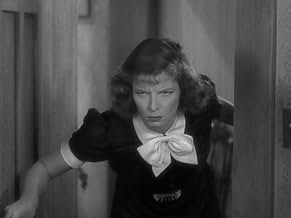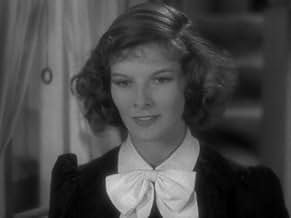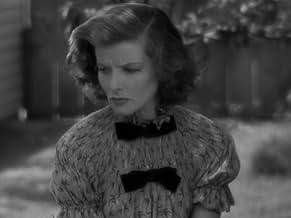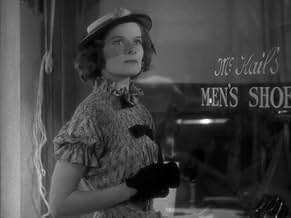CALIFICACIÓN DE IMDb
6.8/10
4.8 k
TU CALIFICACIÓN
Una socialita con apuros económicos navega su nuevo compromiso entre las restricciones impuestas por su familia y un padre inestable.Una socialita con apuros económicos navega su nuevo compromiso entre las restricciones impuestas por su familia y un padre inestable.Una socialita con apuros económicos navega su nuevo compromiso entre las restricciones impuestas por su familia y un padre inestable.
- Dirección
- Guionistas
- Elenco
- Nominado a 2 premios Óscar
- 4 premios ganados y 3 nominaciones en total
Hattie McDaniel
- Malena
- (as Hattie McDaniels)
Brooks Benedict
- Henrietta's Dance Partner
- (sin créditos)
Harry Bowen
- Laborer Putting Up Sign
- (sin créditos)
Steve Carruthers
- Party Guest
- (sin créditos)
Monte Carter
- Waiter at Restaurant
- (sin créditos)
George Ford
- Party Guest
- (sin créditos)
Joe Gilbert
- Party Guest
- (sin créditos)
Opiniones destacadas
This is an often under-rated film, and nowadays would certainly have been completely forgotten but for Katharine Hepburn's presence. As a satirical view of the 1920s filmed in the mid 1930s it feels somewhat dated. But not Hepburn's performance. This is is among the best of her RKO contract movies. Her innocence, her (modest) social pretension, her search for love, they all ring verosimilar - if not entirely true to life. And the celebrated window scene with tears and rain and sobs being one with Alice's feelings is far more than just 'clever'. Hepburn fans will like it. Others might very well follow along.
ALICE ADAMS is the film I'd heard about for years as one of Hepburn's best early films so when I had the chance to watch it recently on TCM I took advantage of it.
From a novel by Booth Tarkington, it concerns a young woman anxious to connect socially with the right people who manages to attract the attention of a handsome and well-to-do young man (Fred MacMurray) at a party. Hepburn shines in the title role, looking fresh and attractive, struggling to keep him interested in her--but unfortunately, with all of her trademark mannerisms not always held in check.
She does well in the role but, in my opinion, the real magnet of interest is the under-appreciated Fred MacMurray who does a sincere and effortless job as her suitor in a role that could not have been easy to bring off. Both stars are in their physical prime, but MacMurray's naturalness only makes Hepburn look even more mannered than usual. Fortunately, this works because her character is supposed to be putting on airs. But at times, this is overdone.
The awkwardness of the social situations are exploited--and the highpoint has to be the warm dinner served on a hot evening, complete with maid service (by Hattie McDaniel) in one of the movie's most amusing, if uncomfortable, scenes. Here too, MacMurray displays just the right amount of stability against all odds. Fred Stone provides a number of chuckles as Hepburn's so provincial father.
All of the supporting roles are nicely filled, with special praise for Ann Shoemaker as the concerned mother anxious for her daughter to find the right suitor. But it's Hepburn's showcase under George Stevens' sensitive direction and she is convincing despite the overly mannered performance.
Summing up: Although some of the situations seemed a bit forced and not everyone will appreciate the humor at Hattie McDaniel's expense, it's worth watching for Hepburn and MacMurray alone.
From a novel by Booth Tarkington, it concerns a young woman anxious to connect socially with the right people who manages to attract the attention of a handsome and well-to-do young man (Fred MacMurray) at a party. Hepburn shines in the title role, looking fresh and attractive, struggling to keep him interested in her--but unfortunately, with all of her trademark mannerisms not always held in check.
She does well in the role but, in my opinion, the real magnet of interest is the under-appreciated Fred MacMurray who does a sincere and effortless job as her suitor in a role that could not have been easy to bring off. Both stars are in their physical prime, but MacMurray's naturalness only makes Hepburn look even more mannered than usual. Fortunately, this works because her character is supposed to be putting on airs. But at times, this is overdone.
The awkwardness of the social situations are exploited--and the highpoint has to be the warm dinner served on a hot evening, complete with maid service (by Hattie McDaniel) in one of the movie's most amusing, if uncomfortable, scenes. Here too, MacMurray displays just the right amount of stability against all odds. Fred Stone provides a number of chuckles as Hepburn's so provincial father.
All of the supporting roles are nicely filled, with special praise for Ann Shoemaker as the concerned mother anxious for her daughter to find the right suitor. But it's Hepburn's showcase under George Stevens' sensitive direction and she is convincing despite the overly mannered performance.
Summing up: Although some of the situations seemed a bit forced and not everyone will appreciate the humor at Hattie McDaniel's expense, it's worth watching for Hepburn and MacMurray alone.
Showing her versatility Katharine Hepburn gets her best part since her Oscar winning Morning Glory in the title role of Alice Adams. Alice and Eva Lovelace are worlds apart. Eva leaves her small town in search of fame and fortune in the theater. But poor Alice just wants to compete with the rest of the girls in her midwest Indiana small town that Booth Tarkington wrote about and land a real Prince Charming of a fellow.
The Prince shows up at a dance she goes to in the person of Fred MacMurray. She's taken with him, but she's ashamed of her family's rather humble living condition. When MacMurray does come calling they have a family dinner that turns into a real disaster.
Kate got one of her Oscar nominations for her role and MacMurray also gets one of his best early film parts as well. Kate's family is also nicely cast with Ann Shoemaker, Frank Albertson, and especially Fred Stone filling out the roles of mother, brother, and father. I do kind of feel sorry for Stone, he's really put upon by his family. In today's world Ann Shoemaker would have gone out and gotten a second job for another income, back then that would have been unthinkable.
Alice Adams is a nice nostalgic trip by Booth Tarkington into the lives and mores of small town Indiana. This film was also George Stevens's first major film and he'd work with Kate again in Woman of the Year.
The Prince shows up at a dance she goes to in the person of Fred MacMurray. She's taken with him, but she's ashamed of her family's rather humble living condition. When MacMurray does come calling they have a family dinner that turns into a real disaster.
Kate got one of her Oscar nominations for her role and MacMurray also gets one of his best early film parts as well. Kate's family is also nicely cast with Ann Shoemaker, Frank Albertson, and especially Fred Stone filling out the roles of mother, brother, and father. I do kind of feel sorry for Stone, he's really put upon by his family. In today's world Ann Shoemaker would have gone out and gotten a second job for another income, back then that would have been unthinkable.
Alice Adams is a nice nostalgic trip by Booth Tarkington into the lives and mores of small town Indiana. This film was also George Stevens's first major film and he'd work with Kate again in Woman of the Year.
When I first watched this film, despite the fact that George Steven's excellent direction makes a rather mundane plot into a very involving film, I was a bit thrown off by the actor who plays Katherine Hepburn's ailing father. About midway through the film I thought: "this guy's not much of an actor...".
However, by the time the film was over, I was completely captivated by the man, mostly due to his big confrontation scene with his boss near the end--in fact, I think I re-played that scene five times to really appreciate it's emotional power. And it is because of Mr. Fred Stone's performance in that scene that "Alice Adams" remains one of my very favorite films.
And who was the man? Well, anyone viewing "Alice Adams" is watching a rare document of American theatrical history. Fred Stone was born in 1873, actually traveled west with his family in a covered wagon, became a circus performer, acrobat, dancer, clown and expert "eccentric dancer." He knew Will Rogers and Annie Oakley, and became a MAJOR musical theater star in the early 20th-century. His most famous role was that of the ORIGINAL SCARECROW in the very first (1902) stage version of the WIZARD of OZ. As a young man Ray Bolger saw the production in Boston, and began to pursue his own "eccentric dancing" career, becoming immortalized himself as the Scarecrow in the 1939 MGM film.
In "Alice Adams", Fred Stone gives a remarkably sympathetic and honest performance, a simple, rather shy and utterly unpretentious Everyman, who, though convalescing from some undisclosed illness, must constantly endure the brow-beatings and guilt trips laid upon him by his nagging wife. By the end of the film, having become entangled in a business venture for which he seems totally unqualified and outraged by his son's thievery, he confronts his own boss in his living room for his big emotional scene. I remember reading in Mr. Stone's autobiography that George Stevens and Katherine Hepburn were so impressed by his performance in this scene that they actually EXPANDED his part in it to give him more screen time.
After Katherine Hepburn steps in to smooth things over with the boss, she has a final tender scene with Mr. Stone, one of those achingly beautiful scenes (with a lovely background score) that brings tears to the eye because of its sincerity and simplicity. You won't find anything like it in any film of the last 40 years--many imitations, yes---but not the REAL thing.
Oh yes, there's Katherine Hepburn too, in a role that requires her to act flighty and charming in an annoyingly overwrought way---a little of it goes a VERY long way. Still, she's lovely. Other stand-outs include Alice's smart-aleck brother, played by Frank Albertson, an appealing light comedy/musical theater guy BEST KNOWN for 2 roles: as Sam "hee-haw" Wainwright in "It's a Wonderful Life" and as the lecherous businessman who gives Janet Leigh the $40,000 in the second scene of "Psycho" (he really had aged a lot by 1959). Also, Charley Grapewin, best-known as Uncle Henry in the 1939 "Wizard of OZ" has a chance to shine as Mr. Stone's slightly cantankerous but generous and warm-hearted boss, Mr. Lamb.
"Alice Adams" is not for everyone; it's a low-key, genteel film about the problems of small-town people who are moving up in the social world and the one family that gets left behind. But thanks to George Steven's sensitive and compelling direction, the film transcends it very earthbound plot and becomes, at least for some of us, a very involving cinematic treasure.
However, by the time the film was over, I was completely captivated by the man, mostly due to his big confrontation scene with his boss near the end--in fact, I think I re-played that scene five times to really appreciate it's emotional power. And it is because of Mr. Fred Stone's performance in that scene that "Alice Adams" remains one of my very favorite films.
And who was the man? Well, anyone viewing "Alice Adams" is watching a rare document of American theatrical history. Fred Stone was born in 1873, actually traveled west with his family in a covered wagon, became a circus performer, acrobat, dancer, clown and expert "eccentric dancer." He knew Will Rogers and Annie Oakley, and became a MAJOR musical theater star in the early 20th-century. His most famous role was that of the ORIGINAL SCARECROW in the very first (1902) stage version of the WIZARD of OZ. As a young man Ray Bolger saw the production in Boston, and began to pursue his own "eccentric dancing" career, becoming immortalized himself as the Scarecrow in the 1939 MGM film.
In "Alice Adams", Fred Stone gives a remarkably sympathetic and honest performance, a simple, rather shy and utterly unpretentious Everyman, who, though convalescing from some undisclosed illness, must constantly endure the brow-beatings and guilt trips laid upon him by his nagging wife. By the end of the film, having become entangled in a business venture for which he seems totally unqualified and outraged by his son's thievery, he confronts his own boss in his living room for his big emotional scene. I remember reading in Mr. Stone's autobiography that George Stevens and Katherine Hepburn were so impressed by his performance in this scene that they actually EXPANDED his part in it to give him more screen time.
After Katherine Hepburn steps in to smooth things over with the boss, she has a final tender scene with Mr. Stone, one of those achingly beautiful scenes (with a lovely background score) that brings tears to the eye because of its sincerity and simplicity. You won't find anything like it in any film of the last 40 years--many imitations, yes---but not the REAL thing.
Oh yes, there's Katherine Hepburn too, in a role that requires her to act flighty and charming in an annoyingly overwrought way---a little of it goes a VERY long way. Still, she's lovely. Other stand-outs include Alice's smart-aleck brother, played by Frank Albertson, an appealing light comedy/musical theater guy BEST KNOWN for 2 roles: as Sam "hee-haw" Wainwright in "It's a Wonderful Life" and as the lecherous businessman who gives Janet Leigh the $40,000 in the second scene of "Psycho" (he really had aged a lot by 1959). Also, Charley Grapewin, best-known as Uncle Henry in the 1939 "Wizard of OZ" has a chance to shine as Mr. Stone's slightly cantankerous but generous and warm-hearted boss, Mr. Lamb.
"Alice Adams" is not for everyone; it's a low-key, genteel film about the problems of small-town people who are moving up in the social world and the one family that gets left behind. But thanks to George Steven's sensitive and compelling direction, the film transcends it very earthbound plot and becomes, at least for some of us, a very involving cinematic treasure.
I suppose that no one ever gave Alice Adams the sage advice that when one goes on a date with somebody, you should just "be yourself." But in the 1935 film "Alice Adams," Katharine Hepburn's title character is too busy trying to hide her humble background and put on hoity-toity airs, whenever she goes out shopping, to a party and especially when being courted, to EVER really be herself, and this desire to climb that social ladder only leads to embarrassing predicaments. This is actually a very charming film, and Hepburn, 28 here, looks extremely pretty, especially when given any number of beautiful close-ups by director George Stevens. The film boasts two wonderful and heartbreaking scenes: an early sequence at a ritzy dance, where wallflower Alice hugs the sidelines while pretending to no one in particular that everything is fine, and a late scene, in which the well-to-do young courter who has taken a fancy to her (nicely played by Fred MacMurray) suffers through a formal dinner with Alice's family in the middle of a heat wave. Hattie McDaniel (listed here as "McDaniels") almost steals this dinner scene as a slovenly, gum-chewing maid. Alice, despite her tendency to put on airs, is at heart a sweet girl (we see that in her relationships with her parents and brother), and the viewer is grateful that a young man is able to see beyond her B.S. and discern her finer qualities. But will upper-class Fred accept Alice, once he learns of her background? That, my IMDb'er friend, I urge you to find out for yourself...
¿Sabías que…?
- TriviaThough Bette Davis won the 1935 Academy Award/Oscar for Peligrosa (1935) beating out Katharine Hepburn in La mujer que supo amar (1935), Davis was noted for saying more than once that she didn't deserve the award that year and that the one who did was Katharine Hepburn.
- ErroresWhen Alice walks with Arthur toward her house for the first time, a woman watering her shrubs can be seen and a letter carrier walks up, then back down her porch steps twice. The background scene repeats itself, letter carrier, woman setting down hose, etc. The letter carrier approaches Alice moments later where she then has to shamefully admit to Arthur that this is, indeed, her house that she is in front of. Likely a rear projection scene that was duplicated.
- Citas
Mrs. Adams: Malena fell down the cellar stairs!
Virgil Adams: Did she break any of our things?
- ConexionesFeatured in George Stevens: A Filmmaker's Journey (1984)
Selecciones populares
Inicia sesión para calificar y agrega a la lista de videos para obtener recomendaciones personalizadas
- How long is Alice Adams?Con tecnología de Alexa
- What was wrong with Alice's father? What was his illness?
Detalles
- Fecha de lanzamiento
- País de origen
- Idioma
- También se conoce como
- Alice Adams
- Locaciones de filmación
- Productora
- Ver más créditos de la compañía en IMDbPro
- Tiempo de ejecución1 hora 39 minutos
- Color
- Relación de aspecto
- 1.37 : 1
Contribuir a esta página
Sugiere una edición o agrega el contenido que falta

Principales brechas de datos
What is the French language plot outline for La mujer que supo amar (1935)?
Responda



































